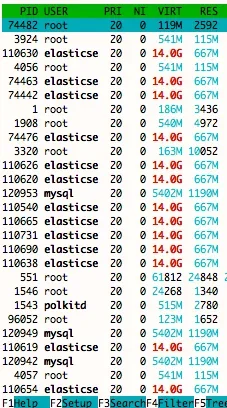Fred.
Well-known member
Hi,
I'm new to Elasticsearch. I installed it and have it running on my test forum now.
I've set the memory settings in /etc/elasticsearch/jvm.options to
Because it will be used on a small forum with less than 100 000 posts. And that should be enough. (I can set it higher if I want because I have more ram)
While it's only active on my test forum with no active usage I still see many processes and ram usage.
Is this normal?
This is what I mean

I'm new to Elasticsearch. I installed it and have it running on my test forum now.
I've set the memory settings in /etc/elasticsearch/jvm.options to
Code:
# Xms represents the initial size of total heap space
# Xmx represents the maximum size of total heap space
-Xms256m
-Xmx256mWhile it's only active on my test forum with no active usage I still see many processes and ram usage.
Is this normal?
This is what I mean


